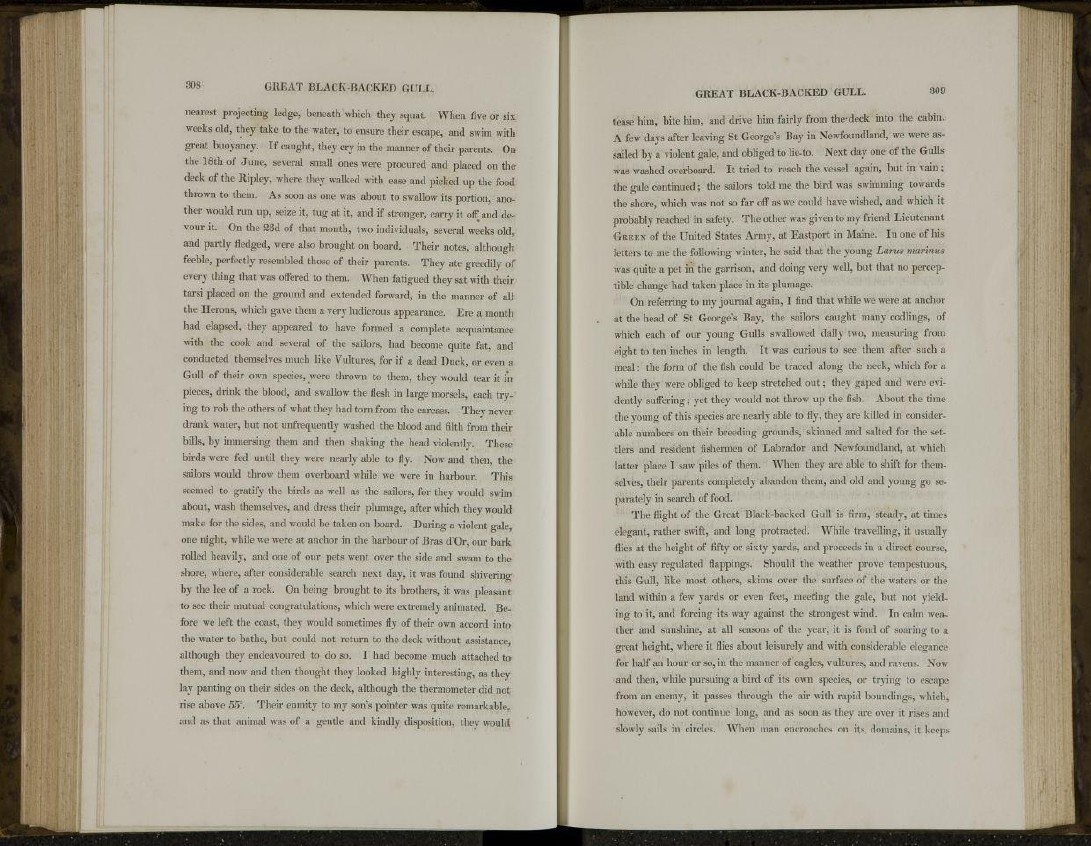
nearest projecting ledge, beneath which they squat. When five or six
weeks old, they take to the water, to ensure their escape, and swim with
great buoyancy. If caught, they cry in the manner of their parents. On
the 18th of June, several small ones were procured and placed on the
deck of the Ripley, where they walked with ease and picked up the food
thrown to them. As soon as one was about to swallow its portion, another
would run up, seize it, tug at it, and if stronger, carry it off and devour
it. On the 23d of that month, two individuals, several weeks old,
and partly fledged, were also brought on board. Their notes, although
feeble, perfectly resembled those of their parents. They ate greedily of
every thing that was offered to them. When fatigued they sat with their
tarsi placed on the ground and extended forward, in the manner of all
the Herons, which gave them a very ludicrous appearance. Ere a month
had elapsed, they appeared to have formed a complete acquaintance
with the cook and several of the sailors, had become quite fat, and
conducted themselves much like Vultures, for if a dead Duck, or even a
Gull of their own species, were thrown to them, they would tear it in
pieces, drink the blood, and swallow the flesh in large morsels, each trying
to rob the others of what they had torn from the carcass. They never
drank water, but not unfrequently washed the blood and filth from their
bills, by immersing them and then shaking the head violently. These
birds were fed until they were nearly able to fly. Now and then, the
sailors would throw them overboard while we were in harbour. This
seemed to gratify the birds as well as the sailors, for they would swim
about, wash themselves, and dress their plumage, after which they would
make for the sides, and would be taken on board. During a violent gale,
one night, while we were at anchor in the harbour of Bras d'Or, our bark
rolled heavily, and one of our pets went over the side and swam to the
shore, where, after considerable search next day, it was found shivering
by the lee of a rock. On being brought to its brothers, it was pleasant
to see their mutual congratulations, which were extremely animated. Before
we left the coast, they would sometimes fly of their own accord into
the water to bathe, but could not return to the deck without assistance,
although they endeavoured to do so. I had become much attached to
them, and now and then thought they looked highly interesting, as they
lay panting on their sides on the deck, although the thermometer did not
rise above 55°. Their enmity to my son's pointer was quite remarkable,
and as that animal was of a gentle and kindly disposition, they would
tease him, bite him, and drive him fairly from the-deck into the cabin.
A few days after leaving St George's Bay in Newfoundland, we were assailed
by a violent gale, and obliged to lie-to. Next day one of the Gulls
was washed overboard. It tried to reach the vessel again, but in vain ;
the gale continued; the sailors told me the bird was swimming towards
the shore, which was not so far off as we could have wished, and which it
probably reached in safety. The other was given to my friend Lieutenant
GREEN of the United States Army, at Eastport in Maine. In one of his
letters to me the following winter, he said that the young Larus marinus
was quite a pet in the garrison, and doing very well, but that no perceptible
change had taken place in its plumage.
On referring to my journal again, I find that while we were at anchor
at the head of St George's Bay, the sailors caught many codlings, of
which each of our young Gulls swallowed daily two, measuring from
eight to ten inches in length. It was curious to see them after such a
meal: the form of the fish could be traced along the neck, which for a
while they were obliged to keep stretched out; they gaped and were evidently
suffering; yet they would not throw up the fish. About the time
the young of this species are nearly able to fly, they are killed in considerable
numbers on their breeding grounds, skinned and salted for the settlers
and resident fishermen of Labrador and Newfoundland, at which
latter place I saw piles of them. When they are able to shift for themselves,
their parents completely abandon them, and old and young go separately
in search of food.
The flight of the Great Black-backed Gull is firm, steady, at times
elegant, rather swift, and long protracted. While travelling, it usually
flies at the height of fifty or sixty yards, and proceeds in a direct course,
with easy regulated flappings. Should the weather prove tempestuous,
this Gull, like most others, skims over the surface of the waters or the
land within a few yards or even feet, meeting the gale, but not yielding
to it, and forcing its way against the strongest wind. In calm weather
and sunshine, at all seasons of the year, it is fond of soaring to a
great height, where it flies about leisurely and with considerable elegance
for half an hour or so, in the manner of eagles, vultures, and ravens. Now
and then, while pursuing a bird of its own species, or trying to escape
from an enemy, it passes through the air with rapid foundings, which,
however, do not continue long, and as soon as they are over it rises and
slowly sails in circles. When man encroaches on its domains, it keeps